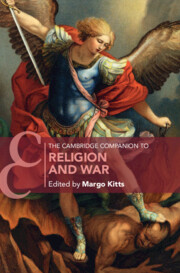Book contents
- The Cambridge Companion to Religion and War
- Cambridge Companions to Religion
- The Cambridge Companion to Religion and War
- Copyright page
- Contents
- Contributors
- Preface
- Introduction
- Part I Classical Foundations
- Part II Just War
- Part III Religious Nationalism
- 14 War in Religious Zionism
- 15 Christian Nationalism and Millennialism in the USA
- 16 The Elusive Dream of Pan-Islamism
- 17 Killing for the Hindu Nation
- 18 Nationalism, Violence and War in Myanmar’s Theravāda Buddhist Context
- Part IV Featured Conflicts
- Index
- Cambridge Companions to Religion (continued from page ii)
- References
15 - Christian Nationalism and Millennialism in the USA
from Part III - Religious Nationalism
Published online by Cambridge University Press: 04 May 2023
- The Cambridge Companion to Religion and War
- Cambridge Companions to Religion
- The Cambridge Companion to Religion and War
- Copyright page
- Contents
- Contributors
- Preface
- Introduction
- Part I Classical Foundations
- Part II Just War
- Part III Religious Nationalism
- 14 War in Religious Zionism
- 15 Christian Nationalism and Millennialism in the USA
- 16 The Elusive Dream of Pan-Islamism
- 17 Killing for the Hindu Nation
- 18 Nationalism, Violence and War in Myanmar’s Theravāda Buddhist Context
- Part IV Featured Conflicts
- Index
- Cambridge Companions to Religion (continued from page ii)
- References
Summary
Christian millennialism served as a kind of lingo through which Americans debated politics and the country’s place in the world during times of war in the USA. Focusing on the role of ecumenical Protestant millennialism, this chapter details the ways in which ideas about the end of the world, combined with contested notions about the USA’s role in divine plans, fostered Christian nationalism and American exceptionalism from the Revolution to the war on terror in the 21st century.
- Type
- Chapter
- Information
- The Cambridge Companion to Religion and War , pp. 314 - 331Publisher: Cambridge University PressPrint publication year: 2023



